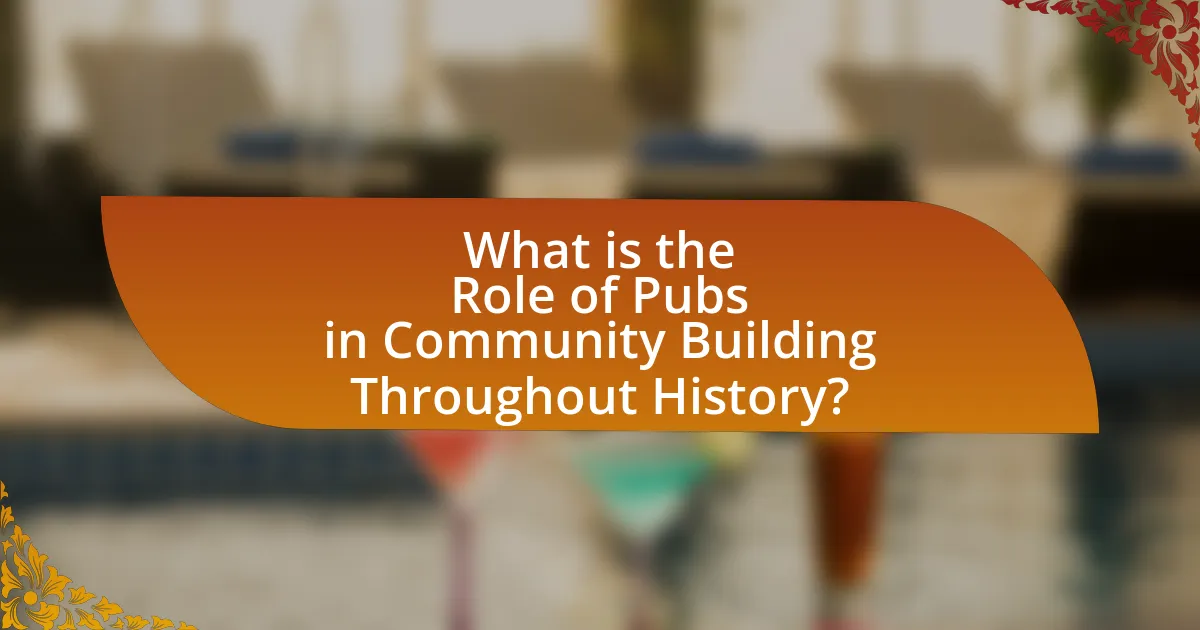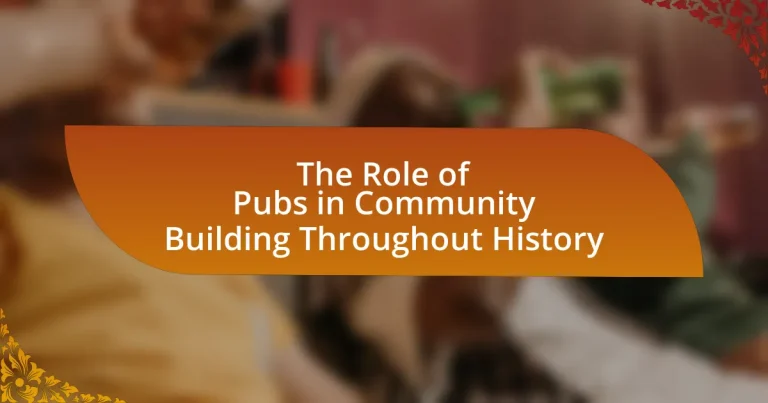Pubs have historically played a crucial role in community building, serving as social hubs that facilitate interaction, cultural exchange, and local engagement. This article explores the evolution of pubs from simple alehouses to multifunctional community centers, highlighting their contributions to social cohesion, civic engagement, and local economies. It examines how pubs have supported social movements, hosted significant historical events, and adapted to modern challenges while continuing to foster community ties through diverse programming and inclusive environments. The discussion also includes the various types of pubs and their specific roles in enhancing community dynamics.

What is the Role of Pubs in Community Building Throughout History?
Pubs have historically served as vital social hubs that foster community building by providing a space for social interaction, cultural exchange, and local engagement. Throughout history, particularly in the United Kingdom and Ireland, pubs have been central to community life, acting as venues for gatherings, celebrations, and discussions that strengthen social bonds. For instance, during the 18th and 19th centuries, pubs became essential meeting places for political discourse and social movements, such as the Chartist movement, which sought political reform in Britain. Additionally, research indicates that communities with active pubs often exhibit higher levels of social cohesion and trust among residents, as these establishments encourage regular interaction and shared experiences.
How have pubs historically contributed to community cohesion?
Pubs have historically contributed to community cohesion by serving as social hubs where individuals gather to interact, share experiences, and build relationships. These establishments have provided a space for communal activities, such as celebrations, meetings, and discussions, fostering a sense of belonging among patrons. For instance, during the 19th century in Britain, pubs became central to local life, often hosting events like political rallies and community gatherings, which strengthened social ties and civic engagement. Additionally, research indicates that regular patronage of local pubs can enhance social networks, leading to increased trust and cooperation within communities.
What social functions do pubs serve in local communities?
Pubs serve as vital social hubs in local communities, facilitating social interaction, fostering a sense of belonging, and promoting community cohesion. They provide a space for individuals to gather, share experiences, and build relationships, which is essential for social bonding. Research indicates that pubs often host community events, such as quiz nights and live music, which encourage participation and strengthen local ties. Additionally, pubs can serve as informal meeting places for local organizations and groups, enhancing civic engagement and collaboration among residents. The historical significance of pubs in community building is evident, as they have traditionally acted as venues for socializing and networking, contributing to the overall social fabric of neighborhoods.
How have the roles of pubs evolved over different historical periods?
Pubs have evolved from simple alehouses in medieval times to multifunctional community hubs in modern society. Initially, during the Middle Ages, pubs served primarily as places for drinking and socializing, often catering to travelers and local laborers. By the 18th century, the role of pubs expanded as they became venues for political discussions and social gatherings, reflecting the rise of the public sphere and democratic ideals. In the 19th century, with the Industrial Revolution, pubs transformed into essential social spaces for the working class, providing a sense of community and belonging amidst urbanization. Today, pubs continue to serve as vital community centers, hosting events, supporting local culture, and fostering social connections, demonstrating their enduring significance in community building throughout history.
Why are pubs considered vital social hubs?
Pubs are considered vital social hubs because they serve as communal gathering places that foster social interaction and community bonding. Historically, pubs have provided a space for individuals to connect, share experiences, and engage in conversations, contributing to the development of social networks. Research indicates that in the UK, approximately 80% of adults visit pubs regularly, highlighting their importance in social life. Additionally, pubs often host events and activities that encourage community participation, further solidifying their role as essential venues for social cohesion.
What unique experiences do pubs offer that foster community interaction?
Pubs offer unique experiences such as social gatherings, live events, and communal activities that foster community interaction. These venues serve as informal meeting places where individuals can connect over shared interests, such as sports viewing or trivia nights, which encourage participation and camaraderie. Historical data indicates that pubs have been central to community life for centuries, often acting as hubs for local news and social discourse, thereby reinforcing community bonds. For instance, a study by the University of Kent found that 70% of pub-goers reported feeling a sense of belonging to their community when visiting local pubs, highlighting their role in enhancing social cohesion.
How do pubs facilitate cultural exchange and local traditions?
Pubs facilitate cultural exchange and local traditions by serving as communal spaces where diverse groups gather to share experiences and customs. These establishments often host events such as quiz nights, live music, and cultural celebrations that encourage interaction among patrons from various backgrounds. For instance, in the UK, pubs frequently celebrate local festivals and traditions, such as St. Patrick’s Day or harvest festivals, which not only promote local culture but also attract visitors, fostering a blend of cultural practices. Additionally, the historical role of pubs as meeting points for social and political discourse has contributed to the exchange of ideas and traditions, reinforcing their significance in community building.

What historical examples illustrate the role of pubs in community building?
Pubs have historically served as vital centers for community building, exemplified by the role of the public house in 18th-century England. During this period, pubs became essential gathering places where local residents engaged in discussions about politics, social issues, and community events, fostering a sense of belonging and civic engagement. For instance, the famous “Penny Universities” of London, where patrons could pay a small fee for a drink and engage in intellectual discourse, illustrate how pubs facilitated the exchange of ideas and strengthened community ties. Additionally, during the Industrial Revolution, pubs often acted as informal meeting points for workers to organize labor movements, highlighting their role in social activism and community solidarity. These historical examples underscore the significance of pubs as communal hubs that contribute to social cohesion and collective identity.
How did pubs influence social movements and community activism?
Pubs have significantly influenced social movements and community activism by serving as gathering spaces for discussion, organization, and mobilization. Historically, pubs have acted as informal meeting points where individuals could share ideas, debate political issues, and coordinate collective actions, such as labor strikes or civil rights campaigns. For example, during the 19th century in the UK, pubs were central to the Chartist movement, where working-class individuals gathered to advocate for political reforms. Additionally, in the United States, pubs played a crucial role in the Prohibition era, where clandestine gatherings fostered resistance against restrictive laws. These venues not only provided a sense of community but also facilitated the exchange of information and strategies essential for activism, demonstrating their vital role in shaping social movements.
What notable events in history were centered around pubs?
Notable events in history centered around pubs include the signing of the Treaty of Paris in 1783, which ended the American Revolutionary War, and the establishment of the first public house in England, the “Olde Trip to Jerusalem,” dating back to 1189. Pubs have served as crucial meeting places for political discussions, social gatherings, and community organization. For instance, the “Crown and Anchor” pub in London was a significant venue for the Chartist movement in the 19th century, where activists gathered to discuss reforms. Additionally, the “Red Lion” pub in Westminster has been historically recognized as a site for political discourse, including meetings that led to the formation of the Labour Party in the early 20th century. These examples illustrate how pubs have played a vital role in shaping social and political landscapes throughout history.
How have pubs supported local economies and community initiatives?
Pubs have supported local economies and community initiatives by serving as vital social hubs that stimulate economic activity and foster community engagement. They contribute to local economies by creating jobs, generating tax revenue, and supporting local suppliers, with the British Beer and Pub Association reporting that pubs contribute £23 billion to the UK economy annually. Additionally, pubs often host community events, fundraisers, and local sports teams, enhancing social cohesion and providing a space for community members to connect. This dual role of economic support and community engagement underscores the significance of pubs in local development.
What are the different types of pubs and their specific roles in communities?
Pubs can be categorized into several types, each serving distinct roles within communities. Traditional pubs, often referred to as “locals,” function as social hubs where residents gather for conversation and camaraderie, fostering community ties. Gastro pubs combine dining with drinking, promoting culinary experiences and attracting diverse clientele, thus enhancing local culture. Sports pubs provide a venue for fans to watch games together, creating a sense of belonging and shared excitement among patrons. Microbreweries and craft beer pubs focus on local brewing, supporting local economies and encouraging community engagement through events and tastings. Each type of pub contributes to community cohesion by offering spaces for social interaction, cultural exchange, and local economic support.
How do traditional pubs differ from modern craft beer establishments in community engagement?
Traditional pubs primarily engage the community through long-established social practices and local events, while modern craft beer establishments focus on niche experiences and innovative programming. Traditional pubs often serve as community hubs, hosting regular events like quiz nights and live music, fostering a sense of belonging among local patrons. In contrast, modern craft beer establishments tend to attract a diverse clientele through unique beer offerings and experiential events, such as beer tastings and brewery tours, which may not always emphasize local community ties. This shift reflects a broader trend where traditional pubs prioritize local culture and social cohesion, while craft beer establishments cater to a more varied audience seeking specialized experiences.
What role do themed pubs play in attracting diverse community members?
Themed pubs play a significant role in attracting diverse community members by creating unique environments that cater to various interests and cultural backgrounds. These establishments often feature specific themes, such as sports, music, or cultural motifs, which resonate with different demographic groups, thereby fostering inclusivity. For instance, a sports-themed pub may attract fans from various regions who share a passion for a particular team, while a pub themed around a specific culture can draw in individuals interested in that culture’s cuisine and traditions. This diversity in themes not only enhances the social experience but also encourages community engagement, as people from different backgrounds come together to share common interests.

How do contemporary pubs continue to shape community dynamics?
Contemporary pubs shape community dynamics by serving as social hubs that foster interaction and engagement among residents. These establishments provide a space for diverse groups to gather, facilitating conversations and connections that strengthen community ties. Research indicates that pubs often host events such as trivia nights, live music, and community meetings, which encourage participation and collaboration among locals. For example, a study by the University of Leeds found that pubs contribute to social cohesion by acting as venues for community events, thereby enhancing local identity and belonging.
What challenges do modern pubs face in maintaining their community role?
Modern pubs face significant challenges in maintaining their community role, primarily due to changing social dynamics, economic pressures, and competition from alternative social venues. The decline in traditional pub attendance has been linked to shifts in consumer behavior, with many individuals opting for home entertainment or socializing in private settings rather than public spaces. Economic pressures, including rising operational costs and increased taxation, further strain the ability of pubs to offer affordable services that attract local patrons. Additionally, competition from bars, restaurants, and online platforms has intensified, making it difficult for pubs to differentiate themselves and retain their status as community hubs. These factors collectively hinder modern pubs from fulfilling their historical role as vital centers for social interaction and community cohesion.
How are pubs adapting to changing social behaviors and preferences?
Pubs are adapting to changing social behaviors and preferences by enhancing their offerings and creating more inclusive environments. Many establishments are incorporating technology, such as mobile ordering and contactless payments, to streamline service and cater to a tech-savvy clientele. Additionally, pubs are diversifying their menus to include healthier options and craft beverages, reflecting a shift towards wellness and artisanal products.
Furthermore, the rise of remote work has led pubs to create co-working spaces, allowing patrons to socialize while also being productive. According to a survey by the British Beer and Pub Association, 60% of pubs have introduced new services or events to attract a broader audience, demonstrating their responsiveness to evolving consumer demands.
What initiatives are pubs implementing to enhance community involvement?
Pubs are implementing various initiatives to enhance community involvement, including hosting local events, supporting local charities, and creating community spaces. For instance, many pubs organize quiz nights, live music events, and themed gatherings that encourage local participation and foster social connections. Additionally, pubs often collaborate with local charities by hosting fundraising events or donating a portion of their profits, which strengthens community ties. Furthermore, some pubs are designed to serve as community hubs, providing spaces for local groups to meet and engage in activities, thereby reinforcing their role as vital centers for community interaction.
What best practices can pubs adopt to strengthen their community ties?
Pubs can strengthen their community ties by actively engaging in local events and supporting community initiatives. By hosting events such as trivia nights, charity fundraisers, or local music performances, pubs create a space for community interaction and foster a sense of belonging. Research indicates that establishments that participate in community activities see increased patron loyalty and local support, as evidenced by a study from the University of Massachusetts, which found that businesses involved in community engagement experience a 20% increase in customer retention. Additionally, collaborating with local organizations and charities enhances the pub’s reputation and reinforces its role as a community hub.
How can pubs effectively engage with local organizations and events?
Pubs can effectively engage with local organizations and events by actively collaborating on community initiatives and hosting events that promote local culture. For instance, pubs can partner with local charities to organize fundraising events, which not only support a good cause but also attract community members to the venue. Additionally, hosting regular events such as trivia nights, open mic sessions, or local art showcases can create a vibrant atmosphere that encourages participation from local artists and organizations. This approach fosters a sense of community and strengthens relationships, as evidenced by studies showing that community-oriented businesses see increased patronage and loyalty from local residents.
What strategies can pubs use to create inclusive environments for all community members?
Pubs can create inclusive environments for all community members by implementing strategies such as diverse programming, accessible facilities, and community engagement initiatives. Diverse programming includes hosting events that cater to various cultural backgrounds, interests, and age groups, which fosters a sense of belonging among different community segments. Accessible facilities, such as ramps, gender-neutral restrooms, and seating arrangements that accommodate individuals with disabilities, ensure that everyone can enjoy the space comfortably. Community engagement initiatives, like collaborating with local organizations and hosting forums for community input, help pubs understand and address the specific needs of their patrons. These strategies are supported by research indicating that inclusive practices in social settings enhance community cohesion and participation, as evidenced by studies from the Journal of Community Psychology, which highlight the positive impact of inclusive environments on social interaction and community well-being.


